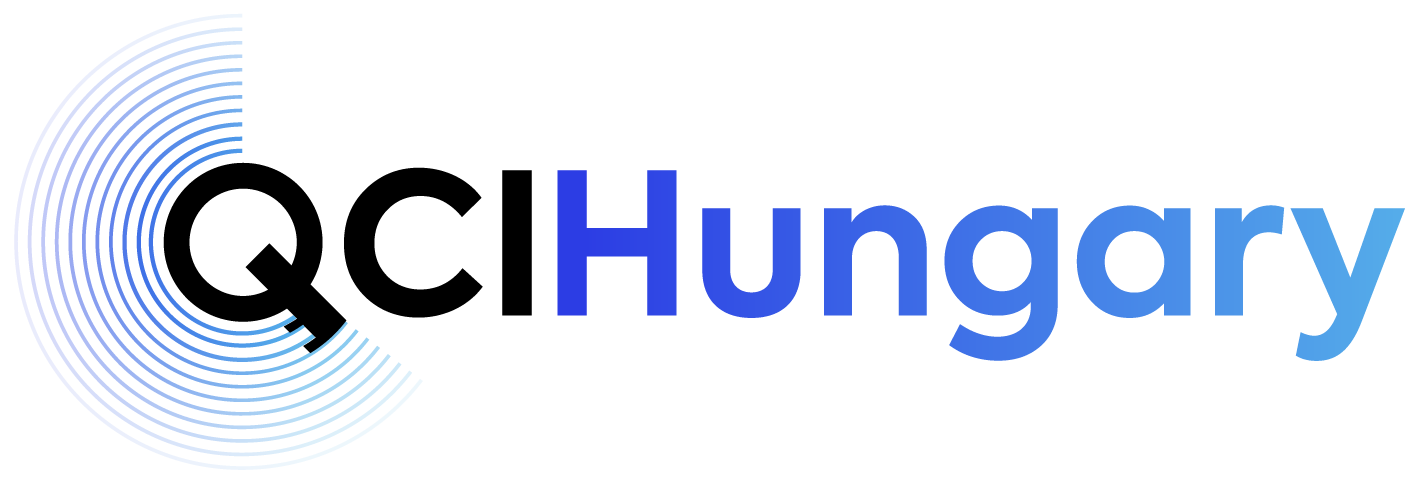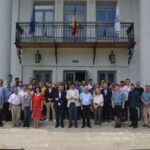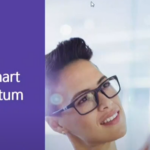Halfway through the initial phase of EuroQCI implementation, the IrelandQCI project organised a 3-day workshop between July 1st and 3rd at the Camden Court Hotel in Dublin.
QCIHungary delegated Ádám Nagy from ELTE Faculty of Informatics, Balázs Visky and Ildikó Kádárné Kelemen from KIFÜ, and Botond Márton PhD student from BME. Botond Márton also delivered a presentation titled ‘CV-QKD system development in Hungary’, a poster was submitted on behalf of the Hungarian national project, as well.

The goal of the Irish workshop was to demonstrate progress of IrelandQCI and other national QCI projects, exchange experiences and discuss future cooperation options.
Among the 150 daily attendees were officers from the European Commission, national policymakers, quantum technology specialists, industry experts, and academic leaders.
The IrelandQCI project, is working to establish a secure QKD communication link along a major network backbone from Dublin to Cork via Waterford. Its objective is to create an innovative quantum technology ecosystem in Ireland. This involves establishing new engineering and test facilities for industry and academia to develop new devices in the quantum network. Educating key stakeholders and building the future quantum workforce has also a high priority in the project.
Day 1 was an event of the Petrus CSA network featuring presentations by industry and academic representatives. Key features of EAGLE-1, Europe’s first satellite Quantum Key Distribution system were described and some information about the coming CEF call, the next step in building a transnational European quantum communication network backbone was also shared. The subsequent workshops enabled open and fair discussion on the lessons learnt so far, the issues faced and future proposed actions. Inputs were expected from the participants on architecture design, use cases, network operations, and sustainability of the NatQCIs.

Day 2 revolved around key stakeholder meetings. The event was honoured by the presence of Minister of State at the Department of the Environment, Climate and Communications: Mr Ossian Smyth, who addressed the attendees in the quality of co-funder, commenting on the importance of the IrelandQCI project and Ireland’s fantastic collaborative efforts. He also commended Waterford’sWalton Institute for organising the 3-day event.

John Regan from ESB Telecoms also welcomed participants and gave the floor to other stakeholders. An overview of EuroQCI was presented by Lauent Olislager, Policy Officer at DGCNECT of the European Commission, followed by a description of ESA’s security and Cryptographic Mission: SAGA by Dr. Christopher A. Vasko from the European Space Agency. Among the Quantum Flagship talks Andrea G. Rodriguez, Lead, ImpaQT UA, held a convincing speech about the implications of quantum technologies for information security, while Jesse Robbers from QuantumDelta, NL emphasized the importance of focusing on the full Quantum Ecosystem. Florian Frövis from QuIC, the European Quantum Industry Consortium, provided valuable insights into the activities of their different work and expert groups. The session included a panel discussion with active participation from the audience.
Other highlights of the morning session were the presentation about Ireland’s Quantum 2030 strategy from Prof. Jiri Vala, Maynooth University and the details of the IrelandQCI project from Prof. Peter O’Brien, Tyndall National Institute.

Participants also learnt about various successful international deployments from Prof. George Kanellos, Technical Coordinator of HellasQCI, Nicholas Frendo at PRISM, Marco Lucamarini from University of York. It was particularly impressive to see the rationale behind selecting the best spots for the submarine connections at the UK-Ireland QCI project and receive information from Cathy White from BT on the 2022 launch of the London Quantum Secured Metro Network.
The afternoon session discussed QKD-PQC implementations in HealthCare by Dr. Homer Papadopoulos, NCSR Demkritos and Syndesis Ltd., the QKD and HPC use case from Piotr Rydlichowski, Poznan Supercomputing and Networking Centre, and Defence Use Cases presented by Catarina Bastos, PTQCI. Developments on quantum communication standards were shared by Sebastian Ramacher, Austrian Institute of Technology.
Day 3 hosted parallel sessions on QKD systems and development use cases and vendor workshops.
Among the first speakers, Botond Márton explained the CV-QKD system development in Hungary. The following use cases definitely increased the curiosity of the participants: towards free space laser communications as explained by Ruth Mackey, CSO, Mbryonics, and quantum computing trends presented by Patrick McNally, CCO Equal1.

The vendors were represented by high level managers of Toshiba, ID Quantique, MDIQKD, QT Labs+ Quantum Industries, Single Quantum. They not only described their products ensuring quantum-safe network architectures and ecosystems, but provided insights into quantum industry trends for the next decade, as well.
The networking events during the 3 days enabled vibrant discussions on future transnational quantum communication cooperation and technology related research.



